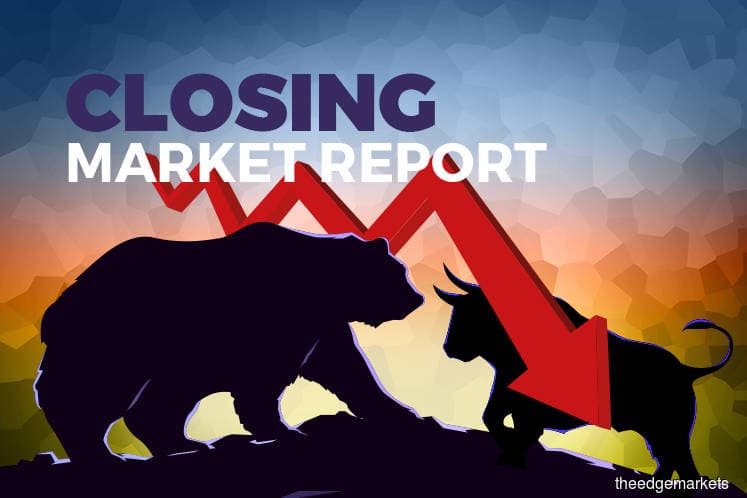
KUALA LUMPUR (March 9): The FBM KLCI closed down 58.94 points or 3.97% today after broad-based selling as global equities took cue from the crude oil price's over 30% drop to some US$30 a barrel after OPEC failed to strike a deal with its allies regarding production cuts amid the Covid-19 outbreak.
At 5pm, the KLCI closed at 1,424.16 while Bursa Malaysia’s index for small market capitalisation stocks fell 1,273.21 points or 10.16% to 11,260.83.
Worst-hit was the energy index, which tracks oil and gas-related share prices after the gauge dropped 256.97 points or 25.39% to 754.95.
Across Bursa Malaysia today, 6.66 billion shares were traded for RM3.63 billion. Bursa registered its all-time high trading volume on Aug 20, 2014 when the exchange saw 7.67 billion shares transacted.
Today, there were 1,139 decliners across Bursa versus 120 gainers. Top decliners included Petronas Dagangan Bhd and Petronas Chemicals Group Bhd while most-active stocks included Sapura Energy Bhd and Hibiscus Petroleum Bhd.
Hibiscus’ share price hit limit down after the stock closed down 30 sen or 42.25% at 41 sen. The stock saw some 222 million shares traded.
Across Asian stock markets, Japan Nikkei 225 closed down 5.07% while South Korea’s Kospi fell 4.19%. In China, Hong Kong’s Hang Seng ended down 4.23% while the Shanghai Stock Exchange Composite dropped 3.01%.
Reuters reported that global share markets tumbled on Monday as panicked investors fled headlong to bonds to hedge the economic trauma of the coronavirus, and oil plunged more than 30% after Saudi Arabia opened the taps in a price war with Russia.
"Brent crude futures were down $12.23, or 27%, at $33.04 a barrel by 0552 GMT, after earlier dropping to $31.02, their lowest since Feb 12, 2016. Brent futures are on track for their biggest daily decline since Jan 17, 1991, at the start of the first Gulf War.
"US West Texas Intermediate (WTI) crude fell by $11.88, or 29%, to $29.40 a barrel, after touching $27.34, also the lowest since Feb 12, 2016. The US benchmark was potentially heading for its biggest decline on record, surpassing a 33% fall in January 1991,” Reuters reported.
It was reported that China’s efforts to curtail the coronavirus outbreak has disrupted the world’s second-largest economy and curtailed shipments to the biggest oil importer.
It was reported that the spread of the virus to other major economies such as Italy and South Korea and the growing number of cases in the US have increased concerns that oil demand will slump this year.
Economists and analysts are mindful of the effects of lower crude oil prices on the global economy and the oil and gas (O&G) sector.
OCBC Bank economist Howie Lee wrote in a note today that the Betrand economic model of competition suggests crude oil prices will fall to the lower cost of production. This level appears to be US$30 a barrel, which is the average cost of production in OPEC, according to Lee.
He said OCBC expects global deflation if oil prices stay at US$30 a barrel for an extended period of time.
"Oil prices play a crucial role in direct inflation inputs and have secondary effects in the cost of production in almost all goods and services.
"Oil at US$30/bbl is almost certain to push inflation in developed countries, which are already struggling with very low inflation rates, into negative territory. This will have an impact on monetary policy, as policymakers see the space and impetus to further loosen monetary policy as they try to keep prices from spiralling into an uncontrollable deflationary cycle,” he said.
CGS-CIMB Securities Sdn Bhd analyst Raymond Yap said the research firm, which maintained its “overweight” rating on the Malaysian O&G sector, had also highlighted risks from the free fall in crude oil prices.
“The implications are generally negative for the Malaysian O&G sector. In the 2014-16 oil price downturn, Petronas cut its operating costs at the expense of its suppliers and contractors,” Yap said.